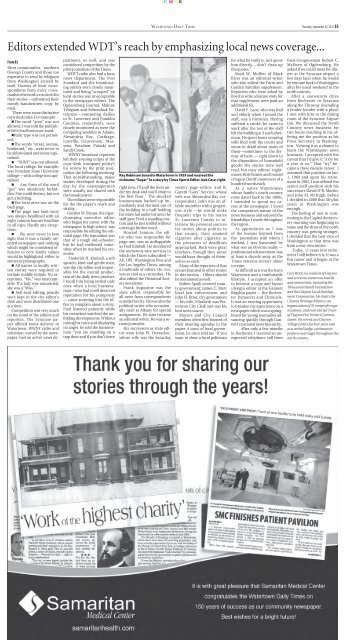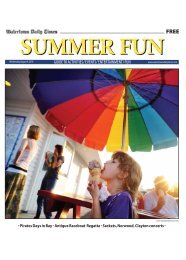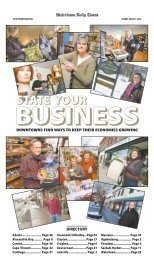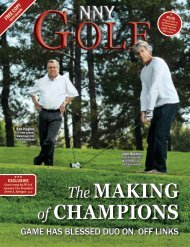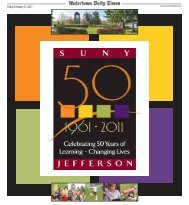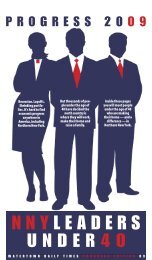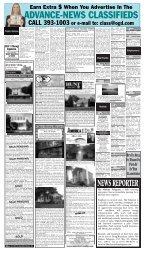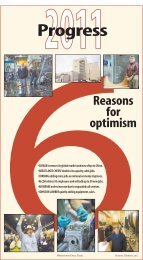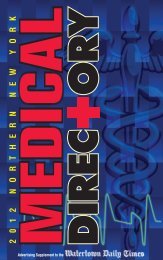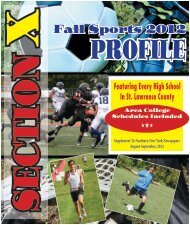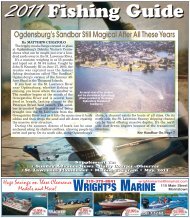C M Y K• 1 50 th A N N I VE R SAR Y • 18 6 1 - 2 0 1 1 •E4 <strong>Thursday</strong>, <strong>September</strong> <strong>22</strong>, <strong>2011</strong>WATERTOWN DAILY TIMESW A T E R T O W N1861 <strong>2011</strong>J OIN US FO R T H E N EXT 1 5 0 Y E A R SWD A I LY T I M E SRECOLLECTIONReporter got her startby stopping the pressesBy MARSHA DAVIS SPIRIDIGLIOZZIThere was the day I “stopped the presses” and theday I got to drive an M-1 Abrams Tank. One day wasa highlight of my nearly 25-year association with the<strong>Watertown</strong> <strong>Daily</strong> <strong>Times</strong>. The other ranksmuch lower.The war in Vietnam was ramping up when I joinedthe <strong>Times</strong> payroll in June 1965 as a proofreader in thecomposing room … a summer job after my freshmanyear at Jefferson Community College. A proofreader’sjob was to compare the type-set story or headline towhat the reporter or page editor hadsent out to the composing room tobe set in lead type, making sure thespelling and punctuation were accurate.While I’m sure the editor spelledit correctly, I did not see the typesetter’serror in what would be the frontpage banner headline for the day’sDavisSpiridigliozziRECOLLECTIONLearning journalismalong the St. LawrenceBy MIKE PELLATLANTA JOURNAL & CONSTITUTIONShortly after graduating from college I arrived in<strong>Watertown</strong> as a green reporter with little experienceoutside of my college newspaper.The <strong>Watertown</strong> <strong>Daily</strong> <strong>Times</strong> had just been featuredin a prominent journalism industry publication, Editorand Publisher, and came highly recommended asa solid newspaper for a young journalist to learn thecraft of reporting and writing.I started covering the ThousandsIslands beat, which included theCanadian border, the ThousandIslands Bridge Authority, environmentaland business issues relatedto the St. Lawrence River and everytown, village, and school districtPellboard meeting between Cape Vincentand Alexandria Bay. Thesewere heady times.The paper published my stories about how thepost 9-11 atmosphere affected northern border communities,including the first news account of federalregulations that would eventually require Americancitizens returning from Canada to carry passports.The paper documented how rules conceived in WashingtonD.C., would play out for American hockeymoms with kids in Canadian leagues and Canadianblue grass guitarists who had strummed at Americanfestivals for decades.Every winter I wrote about the St. Lawrence SeawayAuthority’s none-too-subtle attempts to edge up thestart of the shipping season, despite the fact that theywere unprepared for the oil or chemical spill thatcould accompany the grounding of a large vessel.During the summer I covered the water levels debatesin Clayton.And of course there were the hours of often bafflingconversation with Alexandria’s eccentric supervisor,F. Sampie Sutton. Say what you will, he got the roads,and sometimes even certain driveways, paved ontime.Perry White, then state editor and now city editor,helped develop my writing and reporting skills. He wasexactly the kind of editor all young reporters need. Heis interested, knowledgeable, ethical, gutsy and readyto let you know in no uncertain terms when you makea mistake. In the years following my departure from the<strong>Watertown</strong> <strong>Daily</strong> <strong>Times</strong>, I have worked with many editorsand can think of only a couple that are his equal.And I appreciated working for an editor like JohnB. Johnson Jr., who encouraged me to place ethicalstandards above all else and encouraged me to growas a reporter.Bob Gorman, managing editor, imparted the necessityof not getting too involved in a story and lettingthe facts speak for themselves.Taking my north country experiences with me Imoved on to the Center for Public Integrity, a nonprofit,nonpartisan, investigative news outfit in WashingtonD.C. where I worked for nearly three years.I now write about consumer issues like the sale ofpatient medical debt for the Atlanta Journal Constitution’sinvestigative team.final edition … something abouttroop movements in Vietnam. Itwas the day I learned that if the word“ever” shows up in MANEUVER… you’ve missed the error and it’s time to “stop thepresses.” Ooops!!I spent four proofreading summers between collegeyears at JCC and St. Lawrence University and duringthose years there were so many fulltime composingroom workers and summer staffers that us “summerkids” had to share time card slots with the veteranlinotype workers, typesetters and compositors. Thecompositors were the magicians who could somehowread lines of lead type that appeared upside downand backwards as they placed the galleys of type ontopage-size “trucks” in one of the many labor-intensivesteps of turning a reporter’s words and advertisingcopy into a newspaper “hot off the press.”The transformation of the bustling composingroom with its rows of clattering linotypes, each withtheir pots of molten lead, to the cleanliness of “coldtype” and now to computerized “pagination” marksthe amazing advances in newspaper production overSee Stopping, E6John Brayton Johnson was a 32-yearoldreporter and editorial writer, andsecretary of the Brockway Company,when in May 1949 his father’s suddendeath made him the editor and publisherof the <strong>Watertown</strong> <strong>Daily</strong> <strong>Times</strong>.The only son of the late publisher, JohnJohnson had graduated from Phillips ExeterAcademy in Exeter, N.H., and was apolitical science major at Princeton University,where he received a degree in 1939.Having performed the reporter’s toils at the<strong>Times</strong> during his college-year summers,he joined his father’s reportorial staff upongraduation and assumed the City Hall beat.The staff’s society editor at the time,Catherine A. Common, became JohnJohnson’s wife in June 1941. As the couplemarked their first wedding anniversary,the young journalist packed his bags togo serve his country. With the outbreak ofWorld War II, he enlisted in the Army, wascommissioned a second lieutenant, andwas assigned to counterintelligence in thePacific Order of Battle section in Washington,D.C.Following his December 1945 discharge,John Johnson returned to the <strong>Watertown</strong><strong>Daily</strong> <strong>Times</strong> to begin his 3 1/2 years’ preparationto take over the direction of thenewspaper.He inherited a seasoned newsroom staff,the majority of its members being <strong>Times</strong>’career people -- employees who would staywith the company until retirement, or evenuntil death.Harry F. Landon was in his 17th year asmanaging editor.“He provided that absolutely necessarycontinuity of management and leadershipto this newspaper when the new editor waslearning how and experiencing the difficultiesof the new assignments and the newproblems that were inevitable after HaroldB. Johnson’s death,” John Johnson wrote.“For five years he provided the assistancethat made it possible for an orderly transitionin management.”The assistant managing editor was WilliamE. Pearson, who had recently beenbrought in from the company’s Albanybureau. Gordon Bryant, having just completed17 years as city editor, had been withthe paper 33 years. That made him junioronly to David F. Lane, a veteran of 37 yearsin covering the courts.Alan S. Emory, with two years under hisbelt, was state editor, and 25-year veteranHoward A. Lennon was telegraph editor.John G. Case, popularly known as Jack, wasin his 29th year on the job, the last 20 assports editor.Flanking Mr. Lane on the veteran staffwere John H. Briar, brothers John andDominic Pepp, 19-year veteran FrederickH. Kimball, and Frank P. Augustine, whowas beginning his ninth year.Boyd W. Moffett, a company man since1934, was editing the Farm & Garden supplement,and respected book critic BeulahRector was in her 20th year as a <strong>Times</strong>’ contributor.Clark T. Morrison III, Oswego, and theonly woman reporter, Fauneil J. Rinn, wereFormer WDT staffers are working all over the countryA number of former <strong>Watertown</strong><strong>Daily</strong> <strong>Times</strong> reporters continue towork in journalism. They include:Scott D. Atkinson (1976) WWNY-TVPeter Barber (1987-2002) SchenectadyGazette photographerAmy Biancolli (1987) HoustonChonicle & Hearst Newspapers, musiccriticSteven Billmyer (1984-1986) SyracusePost Standard, team leaderRobert Brauchle (2006-2010) Utica ObserverDispatch reporterScott Bronstein (1994-2001) a news bloggerin PanamaTim Buckland (1998-2005) New HampshireUnion Leader reporterJohn Reed Coston (1971-1973) WallStreet JournalDawn Chmielewski(1986-1987) Los Angeles<strong>Times</strong>Matt Dorney (1989-1996) ColoradoSprings Gazette, copy editorShawn Dowd (1988-1994) AP WesternNew York bureau chief photographerDave Duprey (1990-1998) RochesterDemocrat and Chronicle photographerKeith Epstein (1980-1982) The HuffingtonPost Investigative FundLu R. Feorino (1985-1988) Springfield,Mass. Republican, city editorThomas S. Foster (1981-1984) GannettPaul S. Foy (1984-1990) Associated Press,New York’s youngest publisher in 1949,JOHN JOHNSONexpanded the <strong>Times</strong>’ reach for more than 53 yearsJohn and Catherine Johnson expanded the <strong>Times</strong>’ properties and also its support of NNY education,medical care and the arts.relative newcomers to the “city room.” Thepost of society editor was in transition,from Grace M. Ward to Barbara P. Smith.Mr. Johnson’s team also consisted ofmore than 20 correspondents and stringers,with Ernest G. Cook of Theresa beingthe senior man with his 47 years of writing.John Johnson strived to continue his father’sjournalistic philosophy, which he definedin an article marking the newspaper’s100th anniversary: expansion of news coverageso that the reader can get more newsout of one paper than he had previouslyobtained out of two, referring to a formercompetitor, the <strong>Watertown</strong> Standard.“That is why today the extra effort is alwaysmade for wide, detailed and completecoverage of the news,” Mr. Johnson wrote.Expansion of the printing press facilitiesof the <strong>Times</strong> was an expression of that philosophy,he said. His father had made plansfor a new building, and had purchased twopieces of property at the northwest cornerof Washington and Clinton streets.On one of the sites was a building erectedin 1811 to be a school, but used as a hospitalduring the War of 1812. The structurewas subsequently a seminary for girls, andeventually a residence. When the historicbuilding was bought in 1944 and scheduledfor demolition, Harold Johnson said in aneditorial, “The <strong>Times</strong> makes the purchasesimply to be prepared for necessary expansionsome time in the future.... The <strong>Times</strong>has felt for some time that it should takesome step to insure a location for a newhome eventually.”John Johnson ordered in 1950 an expansionof the printing plant on Arcade Street. Anaddition to the press gave the company theability to print a 40-page edition, increasingby eight pages the previous capacity.AlbanyKarenna Glover(1997-1999) Roanoke(Va.) <strong>Times</strong>John T. Golden(1983-2007) WestchesterCounty BusinessJournalA. Charles Haeffner(1970-1979) The GloverOdessa File, editorJacob Hannah (2006-2008) Lincoln, Neb.Star, photographerVernon Hill (1981-1987) Springfield,Mass. Republican, sports editorJeff Horseman (1999-2000) Riverside,Calif., Press-Enterprise, reporterJay Jochnowitz (1984-1987) Albany<strong>Times</strong> Union, editorial writerJames C. Kevlin (1980-1989) Freeman’sJournal, Cooperstown, publisherMaria Kinsley (2007-2010) Utica ObserverDispatchMargaret Kissinger (1979-1981) MilwaukeeJournalAlison Laurio (2006-<strong>2011</strong>) WinchesterStar, Va.Ken Lovett (1988-1992) New York <strong>Daily</strong>NewsThomas J. Martello (1980-1985) The StarLedger, Newark, N.J., bureau chiefCharlotte McAttee (1986-1988) Springfield,Mass. Republican, production editorGoldenStill bearing the name of the <strong>Times</strong>’founder, the Brockway Company decidedin 1954 to expand its radio holdings intothat new miracle called television, furtherdelaying construction of a new office building.The expansion, John Johnson reasoned,was “good judgment.”“The electronic industry moves fasterthan the printing industry. People like theirnews from their newspapers; they like theirnews from radio and television, but theylike also to be entertained, and the very natureof newspapers, their concept and theirlimitations, prevent them from being verysuccessful as entertainment devices.”So the newspaper continued to functionin a building erected for the New York <strong>Daily</strong>Reformer in 1861, to which had been addedby purchase in 1921 of the Ehrlicher building,adjoined to the north.The first floor housed the press, with theeditorial and composing departments occupyingthe second floor.In its last years of use, the old building’sthird floor lodged the photography unitand a private print shop.“The present home of the <strong>Times</strong> is comfortableand commodious,” Harold Johnsonhad said.“This old building is a homelike place. Itis warm in winter and it is seldom that thereis a day in summer when it is not cool. It isa kindly, hospitable building. To be sure, itis cut up.”But the old building, at 118-132 ArcadeSt., needed constant repair. The floorswere feared unsafe for the weight they hadto support. And certainly, it seemed, thestructure was becoming a fire trap.See Johnson E7Heather McCrea (1999-2002) OrangeCounty, Calif. Register, city editorRandy McMullen (1979-1984) Contracosta,Calif., <strong>Times</strong>William Moore (2006-2007) ArkansasDemocrat GazetteCory Nealon (2004-2007) NewportNews, Va., <strong>Daily</strong> PressMike Pell (2002-2006) Atlanta, Ga.,Journal ConstitutionRalph J. Perkins (1984-1988) SyracusePost Standard, neighbors editorKate Pickert (2001-2002) Time MagazineKaren Pominville (1994-1998) Bangor,Me. <strong>Daily</strong> News, PhotographerGeorge Spohr (2010-<strong>2011</strong>) The World,Coos Bay, Ore.Richard Sullivan (1979-1984) SyracusePost Standard, managing editor.Bob Sutton (1988-1995) Burlington, N.C.<strong>Times</strong> News sports editorKen Tysiac (1993-1995) Charlotte, N.C.Observer, sportsAmanda Voisard (2003-2006) WashingtonPost, photographerGene Warnick (1996-1997) Los Angeles<strong>Daily</strong> News sports editorDennis Watkins (2004-2005) freelancemagazine writerCarl Weiser (1986-1987) Cincinnati Inquirer,reporterCollen White (2006-2010) North JerseyMedia Group, photographer
C M Y KWATERTOWN DAILY TIMES<strong>Thursday</strong>, <strong>September</strong> <strong>22</strong>, <strong>2011</strong> E5Editors extended WDT’s reach by emphasizing local news coverage...From E3River communities, northernOswego County and those tooexpensive to send by telegramfrom Washington arrived bymail. Dozens of local correspondentsfrom every crossroadsin the north ce an inch fortheir stories —submitted theirmostly-handwritten copy bymail.There were some distinctivecopy desk rules. For example:•The word “area” was notallowed. I was told the publisherfelt it had been over-used.•Italic type was not permitted.•The words “street, avenue,boulevard,” etc., were never tobe abbreviated and never capitalized.• “SUNY” was not allowed.The local college, for example,was Potsdam State Universitycollege— with college not capitalized.• Any form of the word“gut” was absolutely forbidden.Fire could destroy, but notgut, a building.•The local news was on theback page.•The page one lead storywas always headlined with aneight column banner headlinein all caps. Hardly any exceptions.• We were never to losesight that it was a family-orientednewspaper and nothingwhich might be considered offensiveto core family valueswould be highlighted, either instories or photographs.• All names in locally-writtenstories were required toinclude middle initials. No exceptions.“Ms.” was unacceptable.If a lady was unmarried,she was a “Miss.”• Soft-lead editing pencilswere kept in the city editor’sdesk and were distributed oneat a time.Competition was very muchon the mind of the editors andreporters. The Syracuse paperoffered home delivery in<strong>Watertown</strong>. WWNY radio andtelevision, owned by the newspaper,had an active news department,as well, and wasconsidered competition by theprint journalists of the <strong>Times</strong>.WOTT radio also had a busynews department. The PostStandard and the broadcastingoutlets were closely monitoredand being “scooped” onlocal stories was unacceptableto the newspaper editors. TheOgdensburg Journal, MaloneTelegram and Adirondack Enterprise---competingdailiesin St. Lawrence and FranklinCounties, respectively, wereclosely monitored as were thecompeting weeklies in Adams,Alexandria Bay, Carthage,Lowville, Gouverneur, Massena,Potsdam, Pulaski andSandy Creek.WWNY broadcast reportersleft their evening scripts at thecopy desk (company policy!)for review by the print journaliststhe following morning.That notwithstanding, majorstories developed during theday by the newspapermenwere usually not shared withthe broadcasters!Our editors were responsiblefor the the paper’s reach andvitality.Gordon W. Bryant, the cigarchompingexecutive editorwho began his career with thenewspaper in high school, wasresponsible for editing the editorialpage. His reputation wasthat of a tough old-schooler,but he had mellowed somewhatwhen he reached his seventies.Frederick H. Kimball, a softspoken, kind and gentle man,was the city editor and responsiblefor the overall productionof the daily news product.I recall him being rattled onlyonce when a local businessman—whohad a well deservedreputation for his pomposity— came storming into the officeto complain about a story.Fred listened patiently whilehis coworkers watched the unfoldingdevelopments. Withoutraising his voice and displayingno anger, he told the businessman“you are standing on atrap door and if you don’t leaveRay Robinson boxed in <strong>Watertown</strong> in 1939 and received thenickname “Sugar” in a story by <strong>Times</strong> Sports Editor Jack Case, right.right now, I’ll pull the lever undermy desk and you’ll drop tothe first floor.” The shockedbusinessman backed up immediatelyand stormed out ofthe building in a huff holdinghis straw hat under his arm; thestaff gave Fred a standing ovationand he just smiled withoututtering a further word.Howard Lennon, the editorwho was responsible forpage one, was as unflappableas Fred Kimball. He monitoredthe numerous wire services towhich the <strong>Times</strong> subscribed —AP, UPI, Washington Post andthe Los Angeles <strong>Times</strong>, amonga multitude of others. He, too,was as cool as a cucumber. Healso edited the Historical Societynewsletter.Frank Augustine was thestate editor, responsible forall news from correspondentsoutside the city. He was also thepolitical writer who occasionallywent to Albany for specialassignments. He later becamean editorial writer. He was a seriousjournalist.His successors as state editorwere John W. Overacker,whose wife was the Saturdaysociety page editor, and R.Gareth “Gary” Service, whosewife was Alexandria Bay correspondent.John was an affablemumbler with a gregariousstyle —he would makefrequent trips to his nativeSt. Lawrence County to interviewhis personal sourcesfor stories about politics inthat county. Gary smokedcigarette after cigarette asthe pressures of deadlinesapproached. Both were greatteachers, though they neverwould have thought of themselvesas such.Many of the reporters of thatera are featured in other storiesin this section . Others shouldbe mentioned as well.Robert Spath covered countygovernment; James C. Brettlocal law enforcement andJohn H. Brior, city government— his wife, Elizabeth was <strong>Watertown</strong>City Clerk and was hisbest news source.Mayors and City Councilmembers often first learned oftheir meeting agendas in thepaper. A cynic of local government,he once told me “if youwant to show a local politicianfor what he really is, just quotehim directly… don’t clean upthe quotes.”Boyd W. Moffett of BlackRiver was an editorial writerwho also edited the Farm andGarden Saturday supplement.Reporters who were asked byBoyd to write a feature story forthat supplement were paid anadditional $5.David F. Lane, who was frailand elderly when I joined thestaff, was a historian. Havingsuffered a stroke, he came towork after the rest of the staffleft the building at 3 each afternoon.He spent hours scouringwills filed with the courts andwrote in detail about many ofthem—sometimes to the dismayof heirs — right down tothe disposition of householdgoods! His stories were wellread, but copy editors’ nightmares.Bob Farmer and I wouldcringe at David’s sentences of ahundred words each.As a native Watertonianwhose family’s north countryroots dated back to the 1800s,I intended to spend my careerat the newspaper. I lovedthe competitive nature of thenews business and enjoyed thefriendships I made throughoutthe region.As appreciative as I wasof the lessons learned fromthe journalists with whom Iworked, I was frustrated bywhat was an obvious reality —professional advancement wasat least a decade away as the<strong>Times</strong> veterans weren’t aboutto retire.As difficult as it was the leave<strong>Watertown</strong> and a comfortablelifestyle, I accepted an offerto become a copy and layout(design) editor at the Gannettflagship paper -- the RochesterDemocrat and Chronicle.It was an exciting opportunityto broaden my experience on anewspaper which was a springboardfor young journalists advancingquickly through Gannett’snational news hierarchy.After only a few monthsin Rochester, I received an unexpectedtelephone call fromthen-Congressman Robert C.McEwen of Ogdensburg. Heasked if we could meet for dinnerat the Syracuse airport afew days later when he wouldbe enroute back to Washingtonafter his usual weekend in thenorth country.After a snowstorm drivefrom Rochester to Syracusealong the Thruway (includinga fender-bender with a plow)I met with him in the diningroom of the Syracuse AirportInn. We discussed the NorthCountry news business fortwo hours resulting in his offeringme the position as hisPress Secretary in Washington.Viewing it as a chance tolearn the Washington newsbusiness, I accepted with thecaveat that I’d give it “a try fora year or so.” That “try” becamea three decade career. Iassumed that position on Jan.1, 1969 and upon his retirementin 1981, I was offered thesenior staff position with hissuccessors David O’B. Martin,and John M. McHugh, beforeI decided in 2000 that 30-plusyears in Washington wasenough.The feeling of awe in commutingto the Capitol dome everymorning was beginning towane and the draw of the northcountry was getting stronger.I decided that the best view ofWashington at that time wasfrom a rear-view mirror.Today, 11 years into retirementI still believe it is. It was afun career and it began at the<strong>Watertown</strong> <strong>Times</strong>.Cary Brick is a resident of Claytonand serves on numerous boardsand committees, including theThousand Islands Foundationand the Clayton Local DevelopmentCorporation. He chairs theClayton Heritage Alliance, anorganization of 31 nonprofit organizations,and is an elected Townof Clayton Fire District Commissioner.He served as a ClaytonVillage Justice for four years andas a retired Judge, continues toperform marriages throughout thenorth country.


